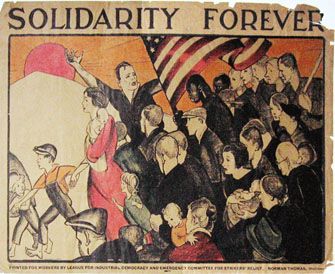We often walk on political eggshells when it comes time to break bread with friends and family, but there is no better an advocate to inform and galvanize support for the cause than someone who is known and trusted.
I’m by no means suggesting you invite people over to hangout and then surprise them with a slideshow set to “Solidarity Forever.” However, educating those closest to you about how their material interests would benefit from union representation, as well as the historical significance that organized labor has had in the U.S. is a worthwhile pursuit.

65% of people in this country have favorable views of labor unions, but many wouldn’t know the first thing about how to form one, or what unions could do to improve their lives. This is where you come in.
Context is everything: respond to the times
More and more people have taken to the streets to demonstrate against injustices in recent years, so it’s not a stretch to assume your friends and family might have attended a rally or two.
From Amazon warehouse workers in Alabama to Columbia University graduate students in New York to possibly you at your own organization, workers across this nation are taking action right now at this very moment. Consider inviting some of your friends or family to go stand in support of a strike happening in your community. Think about contacting an organizer before attending to see if you all can bring any supplies. Once there, you’ll be able to hear from organizers about what’s at stake.
Study after study shows that there is an inverse relationship between economic inequality and union membership in the United States. Workers across companies, fields, and sectors are bound together by a shared struggle to ensure they are justly compensated on the job. Inviting a friend or two to see a union in the streets may help them build empathy with organized labor and inspire them to look into the inequities in their own places of work.
Know your audience
If you’re reaching out to coworkers, make sure to mention any get-togethers outside the office or official work channels used by bosses. You’ll want to invite people with personal emails or phones during non-work hours. While it’s illegal for your supervisor to fire or punish you for organizing, it’s easy enough for them to make up an excuse to make your life difficult. So, like I mentioned above, go to a rally. You could also grab a coffee or meet up in someone’s living room or at a park to talk about labor.
Also, if your friend or relative is a manager or boss, be careful about how you go about talking to them about labor issues. This may be a better one-on-one conversation. Hear them out, but stand firm in knowing that the benchmarks they need to hit at work could be in direct contrast to the worker protections you want to communicate.
Come prepared
Bring article or book recommendations. One of the first books I read that helped me become more aware of labor struggles was A History of America in Ten Strikes by Erik Loomis. Labor Notes and Jacobin are also two great resources to suggest they read on a regular basis.
Make it fun, compelling, and personal
Building class consciousness is all about defining both a sense of collective stakes and community. Together, you can cook a meal, grab a drink, or see a movie. You can bring up a local strike over dinner and get a conversation going about the importance of not crossing that picket line, or you could simply ask the people you invited over about what they know about unions and have a casual conversation.
However you go about educating those near and dear to you, make sure it's some combination of fun, compelling, and personal.
Virtual meetings work well too
Know that you don’t need to see each other in person. Video conferencing is an effective tool for reaching people and accommodating schedules (or a once-in-a-century pandemic).



